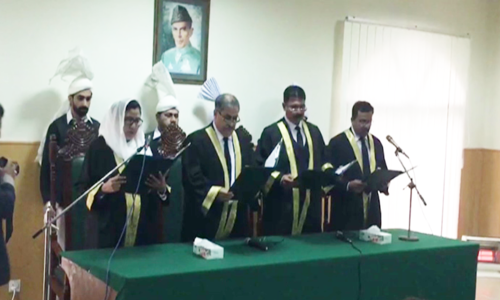ISLAMABAD: The Senate passed a bill on Monday to block the way for outsiders’ appointment as judges of the Islamabad High Court.
The Islamabad High Court (Amendment) Bill 2020, moved by Senator Muhammad Javed Abbasi, sought omission of the words “from the provinces and other territories of Pakistan”, from Section 3(1) of the Islamabad High Court Act.
The section in its present form reads: “The Islamabad High Court shall consist of a Chief Justice and six other judges to be appointed from the provinces and other territories of Pakistan, in accordance with the Constitution.”
After the passage of the bill, only members of the Islamabad High Court bar will be appointed as judges of the IHC.
The House also passed the Provincial Motor Vehicle (amendment) bill, moved by Senator Faisal Javed, and the Ayurvedic and Homeopathic Practitioners’ (amendment) bill, moved by Senator Mahar Taj Roghani.
The Senate passed a resolution urging the government to revise its plan to shift large taxpayer units of the FBR from Quetta to Karachi and from Peshawar to Islamabad.
Voting on resolution seeking concrete steps for making Urdu official language deferred
The resolution was moved by Senator Manzoor Kakar of the Balochistan Awami Party.
The house deferred voting on a resolution moved by Senator Mushtaq Ahmad asking the government to take concrete steps for making Urdu the country’s official language after the Leader of the House, Dr Shahzad Wasim, raised a technical objection.
The resolution said: “In the light of sayings of Allama Muhammad Iqbal and Quaid-i-Azam Muhammad Ali Jinnah about Urdu as the National Language of Pakistan, Articles 5 and 251 of the Constitution of the Islamic Republic of Pakistan, 1973, and the decision of the Supreme Court of Pakistan dated Sept 8, 2015, this House recognises that Urdu is not only the basis of social and cultural identity of the nation but also a symbol of unity and development of the state.
“The House expresses its concern on the fact that despite the sayings of the founders of Pakistan, articles of the Constitution and decision of the Supreme Court, no concrete steps have been taken regarding the national language, resulting in adverse effects on national unity, identity and development.
“Keeping the development of national unity and cultural identity in view, this House recommends that the government should:
(1) take concrete steps for using Urdu as official language in accordance with Article 251 of the Constitution of the Islamic Republic of Pakistan, 1973, within the time period prescribed by the government on July 6, 2015;
(2) take steps for coordination with the provincial governments in order to develop a uniform manuscript of the national language;
(3) take measures to translate and publish the federal and provincial laws in Urdu for facilitation of general public and to upload the same on the Law Division’s website;
(4) make arrangements for conducting the competitive examinations in Urdu and also to make it as medium of instructions in all the educational institutions in the country;
(5) the decision of the courts should be written and published in Urdu gradually;
(6) all the government departments should use Urdu for submission of their comments, replies and arguments in their court cases;
(7) all the academic books should be translated in Urdu by the National Language Authority and other concerned departments so that Urdu can be made medium of instruction in all the educational institutions within one year; and (8) the government should present a monthly report before the National Assembly and the Senate about the action taken for the development of Urdu language.”
Dr Shahzad Waseem said that under the rules, a resolution should be in the form of a declaration or recommendation and has to be precise, covering one definite issue.
He said the resolution in question contained eight recommendations and needed to be redrafted.
Although Senator Mushtaq Ahmad insisted that the resolution was all about enforcement of Urdu as official language and was in accordance with the rules of business, the chair deferred the matter and directed the mover to bring the resolution in an abridged form.
Senator Hafiz Abdul Karim raised the matter of Foreign Minister Shah Mehmood Qureshi’s recent remarks about Saudi Arabia. He described these as inappropriate as Saudi Arabia had always helped Pakistan in tough times.
The house will meet again on Tuesday (today) at 4pm.
Published in Dawn, August 25th, 2020













































